The Star H. G. Wells - In January (about 1900, presumably), the people of Earth awaken to the news that a strange luminous object has erupted, into the Solar System, after disturbing the normal orbit of the planet Neptune. The object is a celestial body whose luminosity is distinguishable on the sky about the constellation of Leo.Although initially it is only of interest to astronomers, eventually the world media announces that it is a whole star, heading in a collision course toward the center of our star system. The star has already consumed Neptune. Many people are concerned by this, but on the whole it amounts to little more than a temporary fad.The rogue star continues on its path, now affecting the planet Jupiter and all its moons. At this point, the studies of a mathematician are published throughout the world. He explains that the intruding star and our Sun are exerting reciprocal gravitational attraction, and as a result it is being pulled deeper into the Solar System. Based on its orientation, it is determined that the star will either hit Earth or pass by at close proximity, which would lead to apocalyptic ecological consequences. As the luminosity disrupts nights on Earth, many people begin to worry, but cynics cite the year 1000, in which humanity also anticipated the world's end.The English winter softens progressively into a thaw, as the intruding star grows fast in the sky. Its high speed is evident during the worst hours of the event. On that day, in the sky above England the apparent size of the star was equivalent to a third of the size of the Moon. Upon reaching the skies of the United States, the apparent size has already increased to the size of the Moon.Soon all of the ice on Earth's surface begins to melt, causing widespread flooding. The star then begins to overshadow the Sun, whose hours seem darker. The planetary crust is affected too, with massive cracks forming and releasing lava on to the surface of the Earth. Tidal waves hit, particularly in the Pacific area, leading to devastation across the world. Most of the human population perishes, and its works are rendered unusable: cities, farms, etc. The few survivors witness the Moon interposing before the traveling star, creating a weak eclipse, as it is permanently removed from its steady orbit about the Earth into a new, more distant orbit. The star then resumes its path and finally meets the Sun.
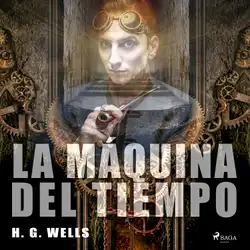
La máquina del tiempo
H. G. Wells
audiobookbook
101 Libros Imprescindibles Para Leer En Tu Vida
Sun Tzu, Teresa de Jesús, Mark Twain, Julio Verne, Friedrich Nietzsche, Lewis Carroll, L. Frank Baum, Franz Kafka, Voltaire, Victor Hugo, Ignacio de Loyola, Nicolás Maquiavelo, Homero, Benito Pérez Galdós, Platón, León Tolstoi, Antón Chéjov, Arthur Conan Doyle, Jane Austen, Emily Brontë, Robert Louis Stevenson, Oscar Wilde, Mary Shelley, Bram Stoker, H. G. Wells, Edgar Allan Poe, H. P. Lovecraft, Washington Irving, Harriet Beecher Stowe, Herman Melville, Jack London, Seneca, San Agustín, Dante Alighieri, Giovanni Boccaccio, Miguel Cervantes, Hans Christian Andersen, Hermanos Grimm, William Shakespeare, John Milton, Tomás Moro, Jean-Jacques Rousseau, Immanuel Kant, Federico García Lorca, Sófocles, Vicente Blasco Ibáñez, Juan Valera, Leopoldo Alas, Miguel De Unamuno, Emilia Pardo Bazán, Duque de Rivas, José Martí, Antonio Machado, Ramón María del Valle-Inclán, Jorge Isaacs, Horacio Quiroga, Gustavo Adolfo Bécquer, Rubén Darío, Charles Baudelaire, Henrik Ibsen, Gibrán Jalil Gibrán
book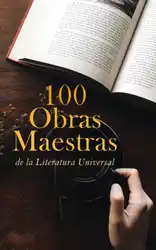
100 Obras Maestras de la Literatura Universal
Homero, Sófocles, Platón, Aristóteles, Apuleius, Seneca, San Agustín, Sun Tzu, Teresa de Jesús, Ignacio de Loyola, Nicolás Maquiavelo, Dante Alighieri, Giovanni Boccaccio, Miguel Cervantes, Hans Christian Andersen, Hermanos Grimm, William Shakespeare, John Milton, Tomás Moro, Jean-Jacques Rousseau, Immanuel Kant, Jonathan Swift, Daniel Defoe, Charles Dickens, William Makepeace Thackeray, Jane Austen, Charlotte Brontë, Emily Brontë, Robert Louis Stevenson, Oscar Wilde, Mary Shelley, Bram Stoker, Henry James, Arthur Conan Doyle, Wilkie Collins, Joseph Conrad, H. Rider Haggard, Edgar Rice Burroughs, H. G. Wells, Edgar Allan Poe, H. P. Lovecraft, Washington Irving, Harriet Beecher Stowe, Mark Twain, Herman Melville, Jack London, Nathaniel Hawthorne, Louisa May Alcott, J. M. Barrie, Lewis Carroll, L. Frank Baum, Voltaire, Victor Hugo, Honoré de Balzac, Gustave Flaubert, Alejandro Dumas, Alejandro Dumas hijo, Julio Verne, Emilio Salgari, Johann Wolfgang von Goethe, Friedrich Schiller, Friedrich Nietzsche, Franz Kafka, Nikolái Gógol, Fiódor Dostoyevski, León Tolstoi, Antón Chéjov, Mijaíl Bakunin, Virginia Woolf, Fernando de Rojas, Lope de Vega, Tirso de Molina, Francisco de Quevedo, Pedro Calderón de la Barca, Baltasar Gracián, José Zorrilla, Vicente Blasco Ibáñez, Juan Valera, Leopoldo Alas, Benito Pérez Galdós, Miguel De Unamuno, Emilia Pardo Bazán, Duque de Rivas, José Martí, Antonio Machado, Ramón María del Valle-Inclán, Jorge Isaacs, Horacio Quiroga, Federico García Lorca, Gustavo Adolfo Bécquer, Rubén Darío, Charles Baudelaire, Henrik Ibsen, Gibrán Jalil Gibrán, José Rizal
book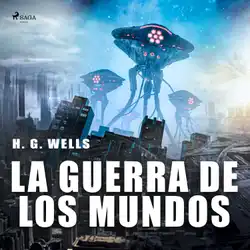
La guerra de los Mundos
H. G. Wells
audiobook
El hombre invisible
H. G. Wells
audiobookbook
Library of Masterpieces - 100 Books to Read in a Lifetime
illiam Shakespeare, Fyodor Dostoevsky, Louisa May Alcott, Miguel de Cervantes, John Milton, Jane Austen, Charlotte Brontë, Emily Brontë, Anne Brontë, William Makepeace Thackeray, George Eliot, Charles Dickens, Thomas Hardy, Jonathan Swift, Daniel Defoe, Joseph Conrad, Robert Louis Stevenson, Mary Shelley, Bram Stoker, Arthur Conan Doyle, Wilkie Collins, Oscar Wilde, T. S. Eliot, D. H. Lawrence, James Joyce, Virginia Woolf, E. M. Forster, Evelyn Waugh, Aldous Huxley, George Orwell, H. G. Wells, Lewis Carroll, Frances Hodgson Burnett, Kenneth Grahame, C. S. Lewis, Malcolm Lowry, Ford Madox Ford, Mark Twain, Jack London, Herman Melville, Ernest Hemingway, Jack Kerouac, Nathaniel Hawthorne, Edith Wharton, Walt Whitman, Kate Chopin, Harriet Beecher Stowe, Neale Hurston, Richard Wright, Raymond Chandler, Dashiell Hammett, F. Scott Fitzgerald, John Steinbeck, William Faulkner, Margaret Mitchell, Sylvia Plath, Carson McCullers, L. Frank Baum, L. M. Montgomery, Leo Tolstoy, Ivan Turgenev, Nikolai Gogol, Johann Wolfgang von Goethe, Friedrich Nietzsche, Thomas Mann, Franz Kafka, Erich Maria Remarque, Albert Camus, Marcel Proust, Jules Verne, Victor Hugo, Gustave Flaubert, Stendhal, Alexandre Dumas, Henrik Ibsen, Rudyard Kipling, Homer, Sophocles, Virgil, Laozi, Sun Tzu, Plato, Marcus Aurelius, Dante Alighieri, Niccolò Machiavelli
book
100 Masterpieces of Mystery
Edgar Allan Poe, Fyodor Dostoevsky, Dashiell Hammett, Arthur Conan Doyle, Josephine Tey, Daniel Defoe, Charlotte Brontë, Emily Brontë, Anne Brontë, Alexandre Dumas, Thomas Hardy, Joseph Conrad, Robert Louis Stevenson, Frances Hodgson Burnett, Jules Verne, Mark Twain, Henry James, Anton Chekhov, Nikolai Gogol, Walter Scott, D. H. Lawrence, Oscar Wilde, H. G. Wells, Edgar Wallace, G. K. Chesterton, Wilkie Collins, R. Austin Freeman, Anna Katharine Green, Mary Roberts Rinehart, F. Scott Fitzgerald, Raymond Chandler, Margery Allingham, Freeman Wills Crofts, Cyril Hare, Shirley Jackson, Ernest Bramah, Sapper, Arthur Morrison, Marie Belloc Lowndes, Dorothy L. Sayers, John Buchan, Robert William Chambers, E. Phillips Oppenheim, Richard Marsh, Annie Haynes, Maurice Leblanc, Gaston Leroux, Émile Gaboriau, John P. Marquand, Patricia Wentworth, Ethel Lina White, Sinclair Lewis, Theodore Dreiser, Bram Stoker, Sheridan Le Fanu, H. P. Lovecraft, William Hope Hodgson, Algernon Blackwood, Washington Irving, Guy de Maupassant, E. C. Bentley, A. A. Milne, Erskine Childers, Earl Derr Biggers
book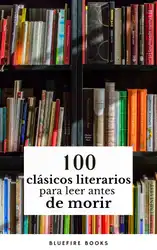
100 Clásicos de la Literatura: Tesoros Literarios Atemporales en un Solo Libro
Francis Scott Fitzgerald, Mary Shelley, Lyman Frank Baum, Louisa May Alcott, Dante Alighieri, Jane Austen, Ambrose Bierce, Emily Brontë, Edgar Rice Burroughs, Lewis Carroll, Wilkie Collins, René Descartes, Charles Dickens, Emily Dickinson, Alexandre Dumas, Gustave Flaubert, Benito Pérez Galdós, Johann Wolfgang von Goethe, Thomas Hardy, E. T. A. Hoffmann, Washington Irving, Henry James, James Joyce, Franz Kafka, Gaston Leroux, Federico García Lorca, H. P. Lovecraft, Publio Virgilio Marón, Lucy Maud Montgomery, John William Polidori, Marco Polo, Antoine De Saint-Exupéry, Emilio Salgari, Walter Scott, Mark Twain, Jules Verne, H. G. Wells, Edith Wharton, Mary Wollstonecraft, Fernando de Rojas, Bluefire Books
book
100 Clásicos de la Literatura - La Colección Definitiva de Obras Maestras en Español para Lectores Apasionados
Francis Scott Fitzgerald, Mary Shelley, Lyman Frank Baum, Louisa May Alcott, Dante Alighieri, Jane Austen, Ambrose Bierce, Emily Brontë, Edgar Rice Burroughs, Lewis Carroll, Wilkie Collins, René Descartes, Charles Dickens, Emily Dickinson, Alexandre Dumas, Gustave Flaubert, Benito Pérez Galdós, Johann Wolfgang von Goethe, Thomas Hardy, E. T. A. Hoffmann, Washington Irving, Henry James, James Joyce, Franz Kafka, Gaston Leroux, Federico García Lorca, H. P. Lovecraft, Publio Virgilio Marón, Lucy Maud Montgomery, John William Polidori, Marco Polo, Antoine De Saint-Exupéry, Emilio Salgari, Walter Scott, Mark Twain, Jules Verne, H. G. Wells, Edith Wharton, Mary Wollstonecraft, Fernando de Rojas, Reading Time
book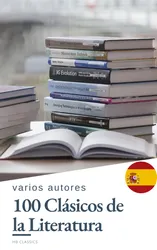
100 Clásicos de la Literatura
Francis Scott Fitzgerald, Mary Shelley, Lyman Frank Baum, Louisa May Alcott, Dante Alighieri, Jane Austen, Ambrose Bierce, Emily Brontë, Edgar Rice Burroughs, Lewis Carroll, Wilkie Collins, René Descartes, Charles Dickens, Emily Dickinson, Alexandre Dumas, Gustave Flaubert, Benito Pérez Galdós, Johann Wolfgang von Goethe, Thomas Hardy, E. T. A. Hoffmann, Washington Irving, Henry James, James Joyce, Franz Kafka, Gaston Leroux, Federico García Lorca, H. P. Lovecraft, Publio Virgilio Marón, Lucy Maud Montgomery, John William Polidori, Marco Polo, Antoine De Saint-Exupéry, Emilio Salgari, Walter Scott, Mark Twain, Jules Verne, H. G. Wells, Edith Wharton, Mary Wollstonecraft, Fernando de Rojas, HB Classics
book
100 Mystery Masterpieces of World Literature : Murder Mysteries, Detective Novels, Supernatural Mysteries & Thriller Classics
Agatha Christie, Edgar Allan Poe, Arthur Conan Doyle, G. K. Chesterton, Wilkie Collins, Charles Dickens, Charlotte Brontë, Emily Brontë, Anne Brontë, Frances Hodgson Burnett, Thomas Hardy, Joseph Conrad, Jules Verne, Mark Twain, Fyodor Dostoyevsky, Anton Chekhov, Nikolai Gogol, Walter Scott, Daniel Defoe, F. Scott Fitzgerald, D. H. Lawrence, Oscar Wilde, H. G. Wells, Edgar Wallace, R. Austin Freeman, Anna Katharine Green, Mary Roberts Rinehart, Ernest Bramah, Sapper, Arthur Morrison, Marie Belloc Lowndes, Dorothy L. Sayers, John Buchan, E. Phillips Oppenheim, Robert William Chambers, J. S. Fletcher, Richard Marsh, Annie Haynes, Alexandre Dumas, Maurice Leblanc, Gaston Leroux, Émile Gaboriau, Marcel Allain, Bram Stoker, Sheridan Le Fanu, H. P. Lovecraft, William Hope Hodgson, Algernon Blackwood, Washington Irving, Guy de Maupassant, E. C. Bentley, A. A. Milne, Sax Rohmer, Erskine Childers, E. W. Hornung, Earl Derr Biggers
book
100 Clásicos de la Literatura
Francis Scott Fitzgerald, Mary Shelley, Lyman Frank Baum, Louisa May Alcott, Dante Alighieri, Jane Austen, Ambrose Bierce, Emily Brontë, Edgar Rice Burroughs, Lewis Carroll, Wilkie Collins, René Descartes, Charles Dickens, Emily Dickinson, Alexandre Dumas, Gustave Flaubert, Benito Pérez Galdós, Johann Wolfgang von Goethe, Thomas Hardy, E. T. A. Hoffmann, Washington Irving, Henry James, James Joyce, Franz Kafka, Gaston Leroux, Federico García Lorca, H. P. Lovecraft, Publio Virgilio Marón, Lucy Maud Montgomery, John William Polidori, Marco Polo, Antoine De Saint-Exupéry, Emilio Salgari, Walter Scott, Mark Twain, Jules Verne, H. G. Wells, Edith Wharton, Mary Wollstonecraft, Fernando de Rojas, Knowledge house
book
